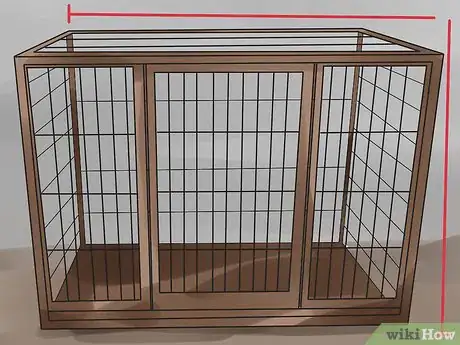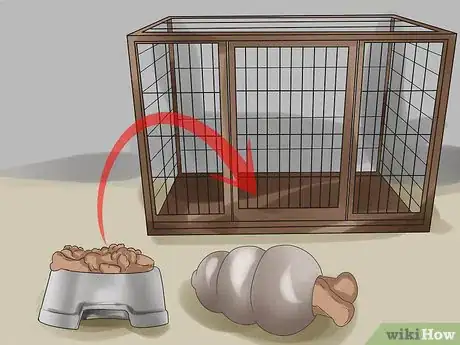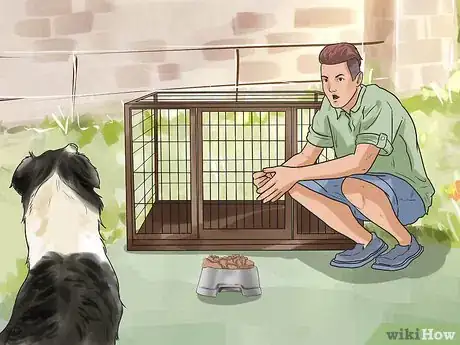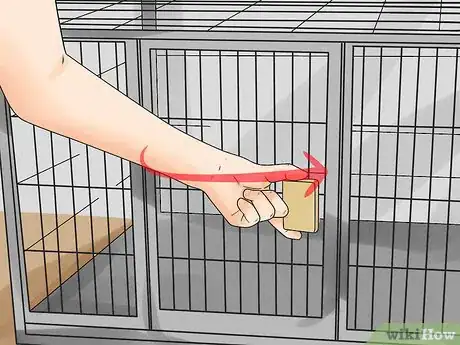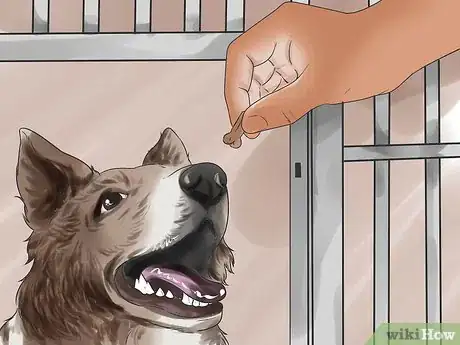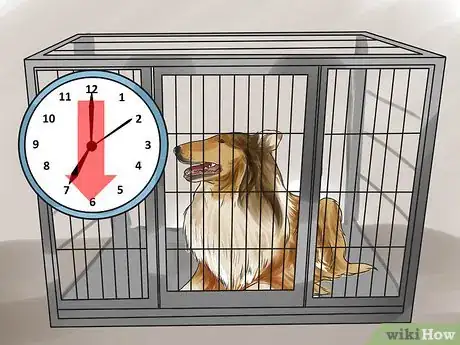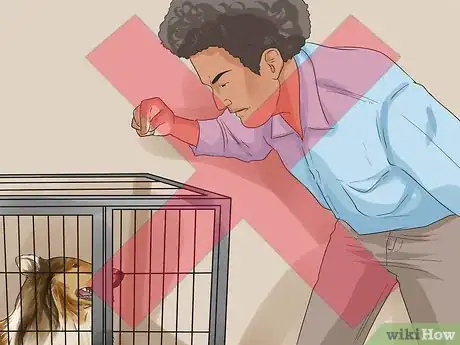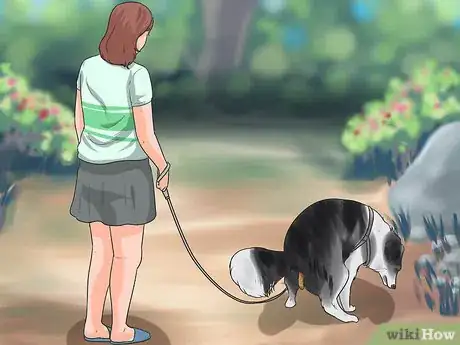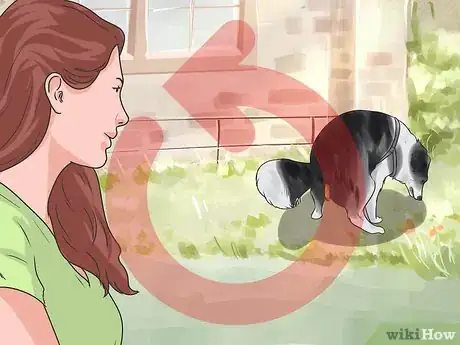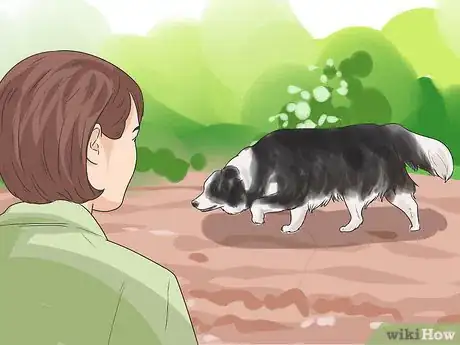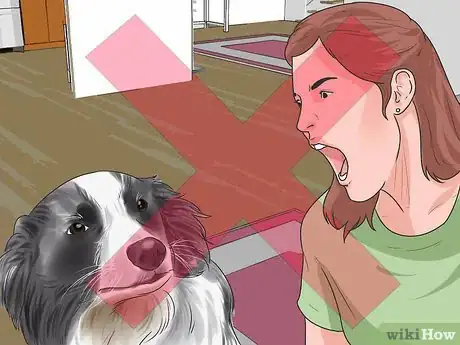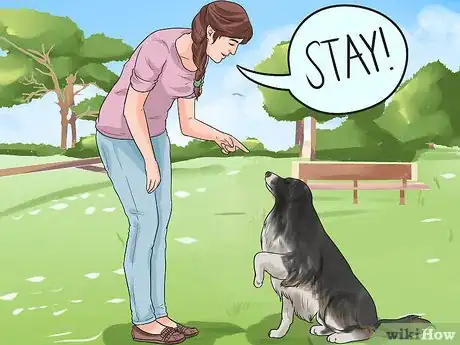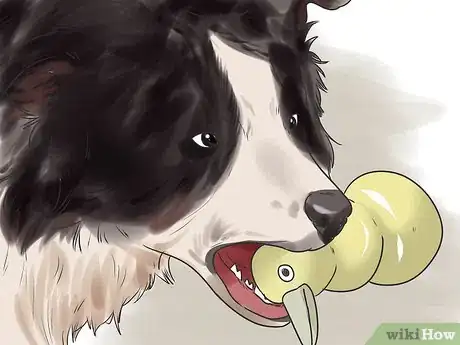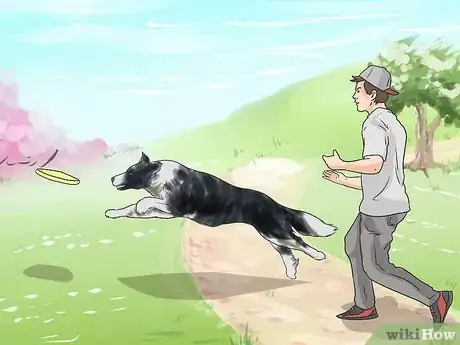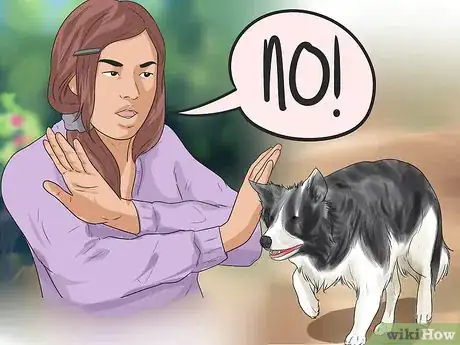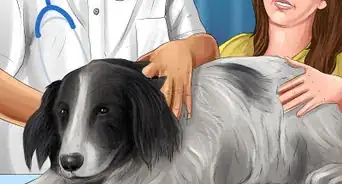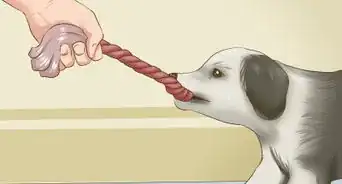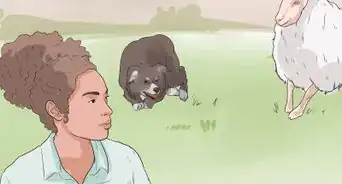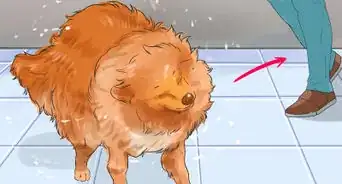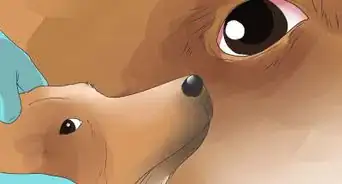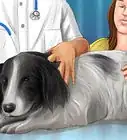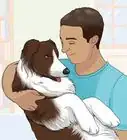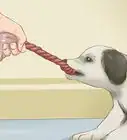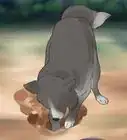This article was co-authored by Brian Bourquin, DVM. Brian Bourquin, better known as “Dr. B” to his clients, is a Veterinarian and the Owner of Boston Veterinary Clinic, a pet health care and veterinary clinic with three locations, South End/Bay Village, the Seaport, and Brookline, Massachusetts. Boston Veterinary Clinic specializes in primary veterinary care, including wellness and preventative care, sick and emergency care, soft-tissue surgery, dentistry. The clinic also provides specialty services in behavior, nutrition, and alternative pain management therapies using acupuncture, and therapeutic laser treatments. Boston Veterinary Clinic is an AAHA (American Animal Hospital Association) accredited hospital and Boston’s first Fear Free Certified Clinic. Brian has over 19 years of veterinary experience and earned his Doctor of Veterinary Medicine from Cornell University.
There are 16 references cited in this article, which can be found at the bottom of the page.
This article has been viewed 42,161 times.
Collies are intelligent, loyal, and playful dogs that make wonderful pets.[1] They are also easy to train and enjoy working hard to please their owners.[2] Although training your Collie will require some time and patience, the training process should be a fun and rewarding experience for both of you. With proper training, your Collie will be a well-behaved dog who will feel loved and accepted by you.
Steps
Crate Training Your Collie
-
1Choose a comfortably-sized crate for your Collie. A crate gives your Collie his own safe space in your home.[3] [4] When you're looking at crates in your local pet store, select one that will be comfortable for your Collie. An ideal crate size for a Collie is 23 inches x 27 inches x 36 inches (58cm x 69cm x 91cm). This size would allow your Collie to move around comfortably, but wouldn't give him enough space to eliminate in a separate area.
- Crate training is a good way to begin house training, since your Collie would learn to eliminate only outside.
- A wire crate is a good choice because it would let your Collie see what's going on around him and feel like he's part of the family.[5]
-
2Give the crate an inviting appearance. Wild dogs create dens in their environment to feel safe. Make the crate feel like a cozy den by placing a towel or blanket on top of it.[6] Inside the crate, place a comfortable blanket or dog bed, along with some favorite toys and a water bowl. If you have a puppy, choose a spill-proof bowl so he doesn't make a watery mess.[7]
- Consider putting bumper pads on the sides of the crate to prevent your Collie's toes from getting stuck in the open spaces. Bumper pads can also provide extra comfort for your Collie and keep him from damaging his teeth on the metal.[8]
Advertisement -
3Entice your Collie to spend time in the crate. When you first introduce your Collie to the crate, he may not simply walk in and start exploring. To encourage him to go inside, place some tasty treats near the crate, just inside the crate's door, and near the back of the crate.[9] He may not eat all of the treats at once; initially, he may feel comfortable eating only the treats outside the crate. Be patient with him and work at his pace until he walks all the way in the crate.
- When he can enter the crate with treats, start feeding him his meals in the crate. You may need to use the same process with the food bowl that you did with the treats.
- Always use a bright and cheery voice when your Collie enters the crate. This type of positive reinforcement will help your Collie learn that the inside of the crate is a good place for him to be.
-
4Close the crate door. Initially, you should leave the crate door open at all times. Once your Collie can eat his meals in the crate, start closing the door behind him when he eats. At first, close the door when he's eating and open it immediately after he's finished. Gradually, leave the door closed for up to 15 minutes after mealtime.[10]
- Your Collie may whine when you close the door. Do not give in! Wait until he stops whining before you open the door.[11] If you respond to the whining by opening the door, he will learn that whining gets positive attention from you.
-
5Keep the crate door closed in different situations. Other than mealtime, practice closing the door when you leave the room. Give your Collie a verbal command ('kennel') to enter the crate, point toward the crate door, and give him a treat when he enters the crate. Close the door, sit with him quietly for a few minutes, then leave the room. Return after a few minutes, sit with him again, then let him out. Work up to leaving the room for 30 minutes at a time.[12]
- When your Collie can handle you leaving the room, leave your home after closing the crate door. Stay calm when leaving your home and returning so your Collie doesn't feel anxious about being left in the crate. Let him out of the crate when you return.
- You can also practice leaving your Collie in the crate overnight.
-
6Do not crate your Collie for too long. Collies love to be around people, so your Collie may start feeling lonely and isolated if you leave him in the crate for more than a few hours at a time. If your Collie is a puppy, he won't be able to hold his bladder for very long and would need frequent potty breaks. In general, the number of hours a puppy can hold its bladder is 1 more than its month in ages.[13]
- For example, a 4-month old puppy can hold its bladder for 5 hours.
- Long hours in the crate can also negatively affect a dog's muscle condition.[14]
-
7Do not use the crate to punish your Collie. With crate training, your Collie should see the crate as a place of a safety and comfort. Never place your Collie in his crate to discipline him. If you do this, he will have a negative association with the crate and probably won't want to spend any time in it.
House Training Your Collie
-
1Allow your Collie to choose an outdoor elimination area. Your Collie should learn to eliminate in the same general area outside. If you have a backyard, take him out on the leash and let him choose where to go. If possible, guide him toward an area that provides protection from wind and rain.[15]
- When he eliminates in the area, he will leave his scent there and go back to that location each time.[16]
-
2Maintain a consistent elimination routine. Proper house training will teach your Collie not just where to eliminate, but also when to eliminate. The sooner you can get your Collie on a bathroom schedule, the less likely he'll have accidents in the house. If you have a Collie puppy, he'll need to eliminate first thing in the morning, before bed, and after eating, drinking, or being crated.[17]
- A puppy should also eliminate after playtime.[18]
- If you have an adult Collie, take him out after his meals.
- If your work schedule prevents you from taking your puppy out frequently, he can use pee pads indoors. Take him to the pee pads and give him a treat when he eliminates on them so he knows to use them when you're gone.
- Reward your Collie with verbal praise and extra petting or a treat each time he eliminates outside.
-
3Watch for bathroom body language. While you're at home with your Collie, keep watch for signs that he needs to eliminate. This is very important if you have a puppy. For example, he may start sniffing the floor, looking at you, or going to the door. When you see these behaviors, take him outside immediately.[19] Praise and reward him when he eliminates outside.
-
4Do not punish your Collie if he has an accident. Your Collie will probably have some accidents as you house train him. Cleaning up the accident won't be any fun for you, but do not take it out on him. Never punish your Collie by rubbing his nose in the feces or urine, yelling at him, etc. Punishment will not prevent future accidents. Rather, it will make him fear you.[20]
- Clean up the accident quiet and calmly. To keep your Collie from going back to that same spot, use an enzymatic cleaner that will erase the scent of urine.[21]
Teaching Your Collie Different Skills
-
1Train your Collie to follow basic commands. Learning basic commands will help your Collie be well behaved at home and in public. Sit, stay, come, and heel are basic commands. Since Collies are so intelligent and eager to please, it probably won't take long before your Collie masters each of these commands.
- Once your Collie learns the basic commands, challenge him with more advanced commands and tricks, like rolling over and playing dead.
-
2Teach your Collie not to bark. Collies usually don't bark very much, but will bark excessively if they become bored or lonely.[22] If your Collie's barking has become a nuisance, you can address the problem in several ways. For example, you can teach him the 'speak' and 'quiet' commands so you can control when he barks.[23]
- If your Collie is bored, give him some new toys to play with. Give him food puzzle toys to keep him busy for long periods of time.
- Schedule daily playtimes with your Collie so he doesn't feel so lonely.
- If your Collie's barking continues to be a problem, ask your veterinarian or a veterinary behaviorist for advice.
-
3Consider dog sports for your Collie. Collies enjoy the physical and mental challenge of activities like agility training, rally, and obedience. These activities would allow your Collie to release pent-up energy and spend much-needed time with you.[24] Ask your veterinarian or other Collie owners for local training classes.
-
4Discourage herding behavior. Collies are natural herders.[25] However, this herding instinct could become problematic if not used properly. For example, your Collie may want to herd your children or other people. He may bite and nip while he's herding, which could be frightening for young children.[26]
- Your Collie may also want to chase after cars, which could lead to serious injury.
- Unless you are specifically training your Collie to herd, discourage him from herding. If you see him herding something inappropriate, try giving him a firm “No!” and redirecting his behavior toward an appropriate physical activity like playing fetch.
Expert Q&A
-
QuestionAre Rough Collies easy to train?
 Pippa Elliott, MRCVSDr. Elliott, BVMS, MRCVS is a veterinarian with over 30 years of experience in veterinary surgery and companion animal practice. She graduated from the University of Glasgow in 1987 with a degree in veterinary medicine and surgery. She has worked at the same animal clinic in her hometown for over 20 years.
Pippa Elliott, MRCVSDr. Elliott, BVMS, MRCVS is a veterinarian with over 30 years of experience in veterinary surgery and companion animal practice. She graduated from the University of Glasgow in 1987 with a degree in veterinary medicine and surgery. She has worked at the same animal clinic in her hometown for over 20 years.
Veterinarian Rough Collies have more of a reputation for being stubborn than their quick-witted cousins the Border Collie. While not difficult to train, Rough Collies do need additional patience and a trainer prepared to be firm but fair.
Rough Collies have more of a reputation for being stubborn than their quick-witted cousins the Border Collie. While not difficult to train, Rough Collies do need additional patience and a trainer prepared to be firm but fair. -
QuestionAre Border Collies hard to train?
 Pippa Elliott, MRCVSDr. Elliott, BVMS, MRCVS is a veterinarian with over 30 years of experience in veterinary surgery and companion animal practice. She graduated from the University of Glasgow in 1987 with a degree in veterinary medicine and surgery. She has worked at the same animal clinic in her hometown for over 20 years.
Pippa Elliott, MRCVSDr. Elliott, BVMS, MRCVS is a veterinarian with over 30 years of experience in veterinary surgery and companion animal practice. She graduated from the University of Glasgow in 1987 with a degree in veterinary medicine and surgery. She has worked at the same animal clinic in her hometown for over 20 years.
Veterinarian Border Collies are easy to train because they are so intelligent. However, in some ways, this can make training hard because the dog can accidentally pick up the wrong message if an inexperienced trainer isn't clear or consistent.
Border Collies are easy to train because they are so intelligent. However, in some ways, this can make training hard because the dog can accidentally pick up the wrong message if an inexperienced trainer isn't clear or consistent. -
QuestionAre Border Collies easy to train?
 Pippa Elliott, MRCVSDr. Elliott, BVMS, MRCVS is a veterinarian with over 30 years of experience in veterinary surgery and companion animal practice. She graduated from the University of Glasgow in 1987 with a degree in veterinary medicine and surgery. She has worked at the same animal clinic in her hometown for over 20 years.
Pippa Elliott, MRCVSDr. Elliott, BVMS, MRCVS is a veterinarian with over 30 years of experience in veterinary surgery and companion animal practice. She graduated from the University of Glasgow in 1987 with a degree in veterinary medicine and surgery. She has worked at the same animal clinic in her hometown for over 20 years.
Veterinarian Border Collies are supremely intelligent dogs and thrive when given guidance and training. This makes them easy to train when their owner sends out clear messages and training sessions happen regularly.
Border Collies are supremely intelligent dogs and thrive when given guidance and training. This makes them easy to train when their owner sends out clear messages and training sessions happen regularly.
Warnings
- Negative reinforcement (e.g., yelling, harsh physical punishment) can make a Collie feel unsure of himself, overly sensitive to correction, and fearful.[30]⧼thumbs_response⧽
References
- ↑ http://dogtime.com/dog-breeds/collie#/slide/1
- ↑ https://www.petcarerx.com/article/collie-training-tips/421
- ↑ Brian Bourquin, DVM. Veterinarian. Expert Interview. 20 December 2019.
- ↑ http://www.gforcebordercollies.com/crate.html
- ↑ http://dogtime.com/dog-health/general/364-housetraining-crate-training
- ↑ http://www.brown.edu/Research/Colwill_Lab/CBP/Crate.htm
- ↑ https://www.preventivevet.com/dogs/what-to-put-in-your-dogs-crate
- ↑ http://dogtime.com/dog-health/general/364-housetraining-crate-training
- ↑ http://www.brown.edu/Research/Colwill_Lab/CBP/Crate.htm
- ↑ http://rspcavic.org/health-and-behaviour/dogs/crate-training-your-dog/
- ↑ http://dogtime.com/dog-health/general/364-housetraining-crate-training
- ↑ http://www.humanesociety.org/animals/dogs/tips/crate_training.html
- ↑ https://www.humanesociety.org/resources/how-housetrain-your-dog-or-puppy
- ↑ http://rspcavic.org/health-and-behaviour/dogs/crate-training-your-dog/
- ↑ https://www.petcarerx.com/article/english-bulldog-care-and-training-facts/292
- ↑ http://www.bostonterrierforums.com/training/house-training-your-boston-terrier
- ↑ http://www.akc.org/learn/akc-training/how-to-potty-train-a-puppy/
- ↑ http://www.dogfoodinsider.com/potty-training-a-puppy/
- ↑ http://www.dogfoodinsider.com/potty-training-a-puppy/
- ↑ http://www.humanesociety.org/animals/dogs/tips/housetraining_puppies.html
- ↑ http://www.akc.org/learn/akc-training/how-to-potty-train-a-puppy/
- ↑ http://dogtime.com/dog-breeds/collie#/slide/1
- ↑ http://www.humanesociety.org/animals/dogs/tips/how_to_stop_barking.html
- ↑ https://www.petcarerx.com/article/collie-training-tips/421
- ↑ http://dogtime.com/dog-breeds/collie#/slide/1
- ↑ https://www.petcarerx.com/article/collie-training-tips/421
- ↑ https://www.petcarerx.com/article/collie-training-tips/421
- ↑ https://www.petcarerx.com/article/collie-training-tips/421
- ↑ http://dogtime.com/dog-breeds/collie#/slide/1
- ↑ http://dogtime.com/dog-breeds/collie#/slide/1
